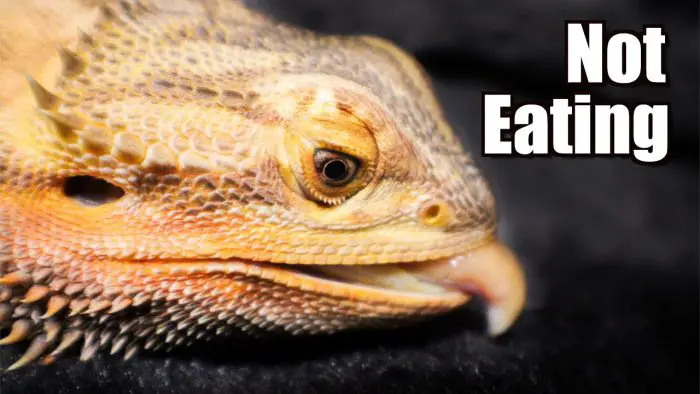
It can be worrying when your bearded dragon suddenly stops eating. A healthy bearded dragon should have a good appetite and be eager for its daily feed of insects and vegetables. So when your beardie loses interest in food, it’s a sign that something is wrong.
In this blog post, we’ll cover the main reasons why a bearded dragon might stop eating and what you can do to get your pet back to normal. Read on to learn more about common causes like brumation, relocation stress, parasites and illnesses. We’ll also provide tips to help stimulate your bearded dragon’s appetite again.
Why Has My Bearded Dragon Stopped Eating?
There are several possible explanations for a loss of appetite in bearded dragons. Here are some of the most common:
Brumation
Bearded dragons naturally slow down and eat less during the winter months. This period of semi-hibernation is called brumation. It’s a normal response to shorter daylight hours and cooler temperatures. Your beardie will gradually start eating less in fall, then eventually stop eating at all for weeks or months while brumating.
Relocation Stress
Bearded dragons are very sensitive to changes in environment and routine. Simply moving your dragon’s enclosure to a different part of the room can stress it out for several days afterwards. Dramatic changes like moving homes, swapping out cage decor, or introducing new pets will also cause relocation stress. This leads to decreased appetite until your bearded dragon adjusts.
Parasites
Internal parasites like coccidia, pinworms and tapeworms irritate a dragon’s digestive tract, making it uncomfortable to eat. You may even spot live worms in your pet’s fecal droppings. Left untreated, parasites can cause weight loss and anorexia along with vitamin deficiencies.
Illnesses
Systemic infections, metabolic disorders, gut issues and other health problems affecting your bearded dragon’s overall wellbeing often reduce appetite. For example, the fungal infection known as yellow fungus disease causes painful lesions on the skin and bars of a dragon’s mouth, preventing normal feeding. Respiratory infections will make breathing laborious, so sick dragons won’t expend energy trying to catch prey until recovered.
Incorrect Housing Temperatures
Bearded dragons are cold-blooded, so they rely on environmental heat to stay warm enough to properly digest food. Temperatures consistently under 70°F (21°C) will suppress appetite. An ideal vivarium provides a 100°F-115°F (38°C-46°C) basking spot, an 80°F-85°F (27°C-29°C) ambient temperature cool end and appropriately warm night temperatures.
Signs of Dehydration
Severe dehydration and associated metabolic disturbances like hypernatremia (high blood sodium) are marked by lethargy, sunken eyes, loose skin and no interest in eating. Ensure fresh water is always available. Spraying the greens daily or providing a water dish large enough for soaking can help prevent dehydration.
What to Do If Your Bearded Dragon Won’t Eat
If your bearded dragon is refusing food for more than 2-3 days in a row, it’s time to intervene. Here are some tips for nursing your beardie’s appetite back to normal:
Check Temperatures
Confirm your vivarium temperatures and temperature gradients offer the ideal habitat for healthy digestion and appetite. Adjust heating devices as needed until each section stabilizes at the proper level. Thermostats help maintain consistency.
Try Different Foods
Offer a diverse buffet of staple feeders like crickets, worms, roaches, slurry mixes and fresh vegetables in case boredom with the same old meals is to blame. Just don’t make all changes at once, as that causes unnecessary stress to your pet.
Rehydrate
Set up a warm, shallow water container (85°F or 29°C) that your beardie can climb into for soaking. Gentle baths for 10-20 minutes will help combat dehydration and metabolic issues. Always supervise bath time in case your pet needs help getting out.
Check Lighting
Does the tank provide 10-12 hours of bright white daylight from overhead bulbs or reptile lighting? Proper daylength and spectrum UVA/UVB rays are vital for stimulating appetite and maximizing nutrition from food. Upgrade lighting as needed.
Add Decoration
Naturalistic accessorizes like branches, leaves, vines, rocks, logs and background graphics promote beneficial behavioral enrichment. Sometimes mental stimulation from cage redecorating is all that’s needed to renew interest in eating.
Minimize Stressors
Evaluate aspects of care and environment that may be causing your bearded dragon unnecessary anxiety. Adjust overly loud or unpredictable ambient noise, move enclosures away from high traffic areas of the home and make sure your dragon has plenty of hides and sight barriers.
Get a Fecal Test
Ask your exotic veterinarian to analyze a fresh fecal sample for gut parasites. If present, appropriate medication will be prescribed to eliminate the appetite-depressing organisms. Follow all treatment guidelines carefully.
See a Reptile Veterinarian
Schedule an urgent veterinary visit if your bearded dragon remains anorectic despite correct husbandry and supportive care at home. The vet will run diagnostics tests to determine if an underlying illness is causing loss of appetite. Early intervention is key for the best outcome.
Force Feed as a Last Resort
The only situation requiring force or assisted feeding of slurry mixes is when a bearded dragon is literally starving and has lost significant body mass because all other supportive measures have failed over an extended timeframe. This decision must be made carefully under veterinary guidance because the process is highly stressful.
Most cases of reduced appetite in pet bearded dragons resolve within a few days just by making sure cage conditions meet the species biological needs. But if your beardie continues refusing food or shows other worrisome symptoms like lethargy or weight loss, waste no time seeking expert reptile medical care to get to the root cause. Catching health issues swiftly gives your pet the best chance of making a full recovery.
